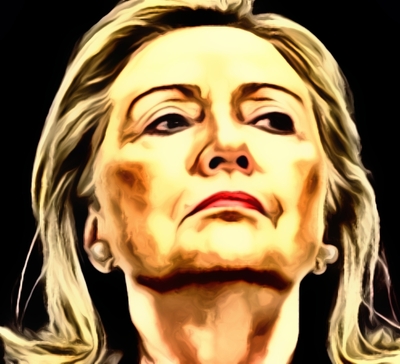
If you had asked any oddsmaker in January to pick the most likely next U.S. president, Hillary Clinton would have been the overwhelming choice.
Since then, the former secretary of state has had a dreadful year, rivaled in political misery only by those of Jeb Bush, Rand Paul and a few other Republican contenders who had to drop out.
Nonetheless, if you asked those oddsmakers the same question today, before the first Democratic presidential debate Tuesday, the answer still would be Clinton.
This time, however, that assessment wouldn't reflect her strength, but rather the lack of a strong alternative at this stage. Even Democrats worried about her general election prospects -- a growing population -- dismiss the possibility of her rival Bernie Sanders winning the nomination. And they are skeptical that Vice President Joe Biden will run or, if he did jump in, that he would win. The Republicans are in such chaos that a pathway to victory appears elusive.
Yet looking at Clinton's problems, and some of her less- often-cited promise, suggests how on the mark those odds may be.
Her cavalier and clumsy reaction to the controversy over the use of her private e-mail system as secretary of state is a case study in arrogance and poor political instincts. There probably isn't a smoking gun and the House Republicans' Benghazi investigative committee, before which she will testify next week, has been discredited as a partisan assault.
Yet she has taken a hit in the polls; voters don't like revisiting the trials and tribulations of Clintonland.
The campaign makes surprising blunders, leaking stories about tactics -- Hillary will offer a softer image-- or her electoral firewalls.
Democratic professionals say that, in contrast to her last presidential campaign, she has strong leadership with John Podesta as chief executive and Robby Mook as campaign manager or chief operating officer. Privately, however, there is concern that crisis management sometimes comes down to a small coterie of personal intimates, her daughter, Chelsea, and Huma Abedin, a longtime aide and surrogate daughter.
Still, there are also encouraging signs for her supporters. After stiffing the media for the first part of her campaign, Clinton has done well in a series of recent interviews. She hates the press but does better when she engages.
No campaign has offered more substance, even if it was overshadowed by the e-mail contretemps. To be sure, some of this is politically calculated: Her biggest threat would be losing the first few nominating contests to Sanders, so her campaign is determined to protect the left flank.
Her only really egregious act of pandering was her announcement last week that she opposed the Trans-Pacific Partnership, the trade agreement involving the U.S. and 11 countries, which will encompass 40 percent of the global economy. She long supported such a pact; her stated rationale for opposing it was specious and added to questions about her credibility or trustworthiness.
(Some of the outrage from the Washington establishment, while justified, contrasts with the silence when it come to the disingenuous pandering of others: Jeb Bush's flip-flops on discrimination under the guise of protecting religious expression, or John Kasich who, under the shadow of Donald Trump, endorsed a wall along the Mexican border.)
There's a lot of real meat elsewhere. No one has offered a more sensible or feasible proposal to deal with the crushing debt imposed on many families by the costs of college. The same holds for her proposals to establish a sliding-scale capital gains tax rate, her focus on longer term economics, and initiatives to give financial regulators more powers and to impose a "risk fee" on big banks.
These offerings have drawn fire from the left and the right. But the financial measures were carefully crafted: She consulted experts including top Wall Street executives and former Rep. Barney Frank. Her July remarks on "quarterly capitalism" was one of the best economic speeches of this political season.
The two big tests she faces over the next 10 days -- the debate and the Benghazi hearings -- are opportunities to reaffirm the current odds and overcome much of this year's self- inflicted damage.
Previously:
• 09/23/15: Why Jimmy Carter couldn't win the South today
• 09/17/15: Gov. John Kasich's standout record in Ohio
• 09/03/15: Republicans chart 4 paths to stopping Trump
• 08/31/15: Here's how Biden-Warren sort of makes sense
• 08/28/15:Trump upends New Hampshire's substantive tradition
• 08/26/15:Jeb Bush is hugging the wrong president George
• 08/24/15: Underestimating Ted Cruz? That's a mistake
• 08/19/15: US holds steady in a world of economic trouble
• 08/12/15: Who will capture Iowa conservatives after Trump?
• 08/10/15: Debate fireworks that won’t make much impact
• 07/29/15: A plea for conservatives to speak from the heart
• 07/09/15: Ex-Im Bank's undeserved rap for crony capitalism
• 06/24/15: All presidential candidates should be in debates
• 06/03/15: Foreign policy traps await Republicans and Hillary
• 06/01/15: It's small stuff that wrecks presidential runs
• 02/04/15: Can Walker be president without a college degree?
Comment by clicking here.
Albert R. Hunt is a Bloomberg View columnist. He was formerly the executive editor of Bloomberg News, directing coverage of the Washington bureau. Hunt hosts the weekly television show "Political Capital with Al Hunt." In his four decades at the Wall Street Journal, he was a reporter, bureau chief and executive Washington editor, and wrote the weekly column "Politics & People." Hunt also directed the Journal's polls, was president of the Dow Jones Newspaper Fund and a board member of the Ottaway community newspapers. He was a panelist on the CNN programs "The Capital Gang" and "Novak, Hunt & Shields." He is co-author of books on U.S. elections by the American Enterprise Institute and the Brookings Institution.



 Contact The Editor
Contact The Editor
 Articles By This Author
Articles By This Author